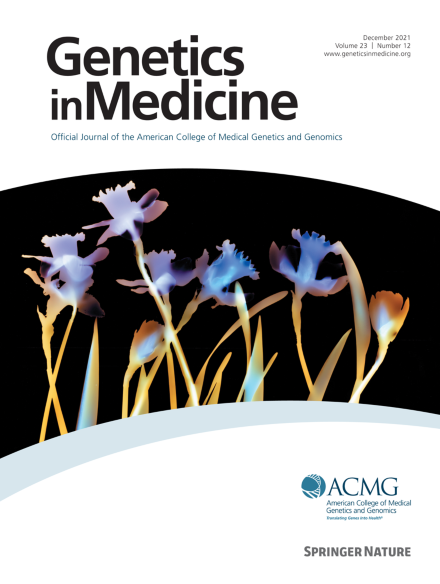The cost-utility of targeted germline BRCA testing in localized prostate cancer followed by cascade testing first-degree relatives with pathogenic variants
IF 6.2
1区 医学
Q1 GENETICS & HEREDITY
引用次数: 0
Abstract
Purpose
Genetic testing is recommended in localized prostate cancer (PCa) with elevated risk and in metastatic PCa. The economics of genetic testing in metastatic PCa has been evaluated but not assessed in localized PCa. We examined the cost utility of germline BRCA testing in localized PCa with high risk of pathogenic variants.
Methods
Cost-utility analysis of germline BRCA testing in localized PCa with (1) high/very high-risk classification, (2) family history of PCa, and (3) Ashkenazi-Jewish ancestry. Analyses were performed from an Australian payer perspective using semi-Markov models over lifetime; quality-adjusted life years (QALYs) were the health outcomes. Decision uncertainty was characterized using 1-way and probabilistic sensitivity analyses.
Results
The incremental cost-effectiveness ratio of BRCA testing compared with no testing was AU$591,408/QALY in patients with high/very high risk, AU$3.9 million/QALY with family history of PCa, and AU$650,098/QALY in Ashkenazi-Jews. Adding cascade testing of first-degree relatives (FDRs) resulted in incremental cost-effectiveness ratios of AU$18,872/QALY, AU$47,294/QALY, and AU$14,637/QALY in the aforementioned groups. At a willingness-to-pay of AU$75,000/QALY, BRCA testing was not likely to be cost-effective in PCa patients; however, it was cost-effective after cascade testing FDRs.
Conclusion
Germline BRCA testing may not be cost-effective when limited to patients with localized PCa but demonstrates value for money when extended to FDRs.
靶向生殖系BRCA检测在局部前列腺癌中的成本效用,随后进行一级亲属致病变异级联检测。
目的:基因检测被推荐用于高风险的局部前列腺癌(PCa)和转移性前列腺癌(mPCa)。基因检测在mPCa中的经济效益已被评估,但在局部PCa中尚未评估。我们研究了种系BRCA检测在具有高风险致病变异的局部PCa中的成本-效用。方法:分析生殖系BRCA检测在1)高/高危分类的局限性前列腺癌中的成本-效用;2) PCa家族史;3)德系犹太人血统。从澳大利亚付款人的角度进行分析,使用终身半马尔可夫模型;质量调整生命年(QALYs)是健康结局。决策不确定性采用单向和概率敏感性分析表征。结果:BRCA检测与不检测的增量成本-效果比(ICER)在高/高危患者中为591,408澳元/QALY,有PCa家族史的患者为390万澳元/QALY,德系犹太人为650,098澳元/QALY。加入一级亲属级联检测后,上述组的ICERs分别为18,872澳元/QALY、47,294澳元/QALY和14,637澳元/QALY。在愿意支付75000澳元/QALY的情况下,BRCA检测在PCa患者中不太可能具有成本效益;然而,在对fdr进行级联测试后,该方法具有成本效益。结论:生殖系BRCA检测在局限于局部PCa患者时可能不具有成本效益,但在扩展到fdr时显示出物有所值。
本文章由计算机程序翻译,如有差异,请以英文原文为准。
求助全文
约1分钟内获得全文
求助全文
来源期刊

Genetics in Medicine
医学-遗传学
CiteScore
15.20
自引率
6.80%
发文量
857
审稿时长
1.3 weeks
期刊介绍:
Genetics in Medicine (GIM) is the official journal of the American College of Medical Genetics and Genomics. The journal''s mission is to enhance the knowledge, understanding, and practice of medical genetics and genomics through publications in clinical and laboratory genetics and genomics, including ethical, legal, and social issues as well as public health.
GIM encourages research that combats racism, includes diverse populations and is written by authors from diverse and underrepresented backgrounds.
 求助内容:
求助内容: 应助结果提醒方式:
应助结果提醒方式:


